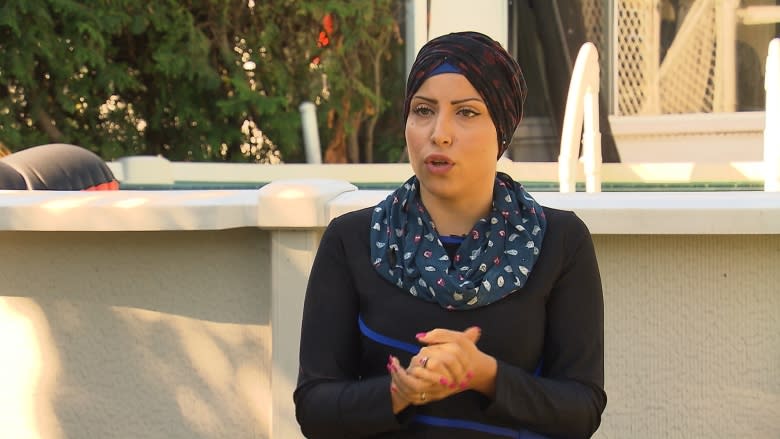Quebecers worry about burkini debate
France's top administrative court has overturned a controversial ban on burkinis, but some Quebecers are concerned about the bathing suit becoming a source of tension on beaches and public swimming pools.
Elsy Fneiche, who lives in Laval, says it's her personal decision to wear a burkini because that is what she feels most comfortable in. The burkini is a full-body swimsuit that is similar to a wetsuit, meant for women who normally wear the hijab.
"My partner doesn't get involved. He doesn't think it's up to him to have an opinion on the burkini or how I dress," Fneiche said.
But she braces herself every time she ventures to the public beach with her young son. Fneiche says she is often the target of insults and dirty looks.
"Where will I be welcome? Will I be insulted, or humiliated or looked at like I'm an alien?"
A group outside of Montreal's French consulate echoed the same concerns Saturday during a rally against Islamophobia. They argue that the burkini is a personal choice.
"It has come to a point where secularism is just Islamophobia," Sooraya Peerally said.
"You could even debate whether a burkini is just a sign of showing your way of Islam because it could just as well be a wetsuit and it breaks my heart."
Burkini sold for years in Montreal
The controversy in France may have made waves in Quebec, but store owners who sell the swimsuit say they haven't seen a decrease in sales.
Yildiz Zengin, the owner of Yildiz Collection on St-Hubert Street, told Radio-Canada she sells maybe 10 burkinis each day.
"It's practical," she said. "You put it on, you're free in your movements and your body isn't bare. For a woman, it can help her feel more comfortable."
'It allows us to be free'
Mariem Mezlini, the owner of Maya Square, designs, creates and sells burkinis in Montreal. She said the garment isn't a form of oppression against women and that she has never had an issue with selling them.
"It's the opposite," Mezlini told Radio-Canada. "It allows us to be free. We have to accept that we all don't have the same norms and tastes."
Mezlini says she has never had a problem with wearing her burkini in public, but she does worry that France's failed ban will eventually spark similar legislation in Quebec and prevent Muslim women from bathing in public.
"The extremists don't wear the burkini," she said. "They wouldn't allow a woman to wear pants or to go in the water. A burkini is for women who want to integrate, who want to participate in an array of activities all while feeling comfortable."
Fneiche doesn't think Quebec will follow suit.
"I don't think that Quebec and France are similar in this way. Not at all. Our politics, our ideas are not at all similar, thankfully," Fneiche said.



